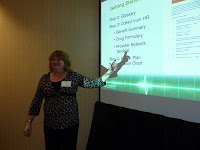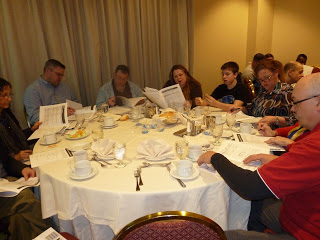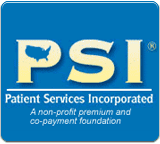Pulse on the Road: Albany!

We had a wonderful visit to Albany, to meet members of the New York Coalition of hemophilia organizations. Bob Graham, person with hemophilia, helped facilitate our invitation and arrival and welcomed us Sunday, March 10. It was a small gathering of families and some clinicians, who eagerly drank in all the insurance information we presented.
Kelly Fitzgerald, associate director of government relations at Patient Services Inc. (PSI) gave everyone a 45-minute update on the Affordable Care Act. Key take-aways include:
• In 2014, everyone must have health insurance
• You may need to select your insurance in a “marketplace”
• You must read your insurance policy annually and carefully!
I then gave a talk called “The Importance of Choosing a Healthcare Plan,” infused with humorous stories of my own son’s struggle with insurance (hint: good idea to have your insurance and medical mail forwarded from mom’s house to your place over a pizza shop!) and stressing that you must pay attention to open enrollment dates. Do you know yours??

Michelle Rice, public policy director of NHF, then gave her acclaimed one hour workshop on the NHF Insurance Toolkit. We passed out workbooks and calculators and I was so impressed by the audience’s dedication! Even the teens were busy crunching numbers to see how “John Doe”‘s medical expenses add up when comparing two plans.
And finally, we had a 30 minute expert panel, so the audience could ask questions of the speakers. I learned a lot. One nurse in the audience offered this excellent piece of advice: when using medical services, instead of asking “Do you accept this insurance?” instead ask, “Are you in network with this insurance plan”? This pointed question could save you so many hassles, time and paperwork!


Thanks to Bob Graham, the New York Coalition, my team, our guest speakers, and all the families who attended. Deepest gratitude to Baxter Healthcare Corporation for sponsoring Pulse on the Road. For more information about health care reform, visit:




